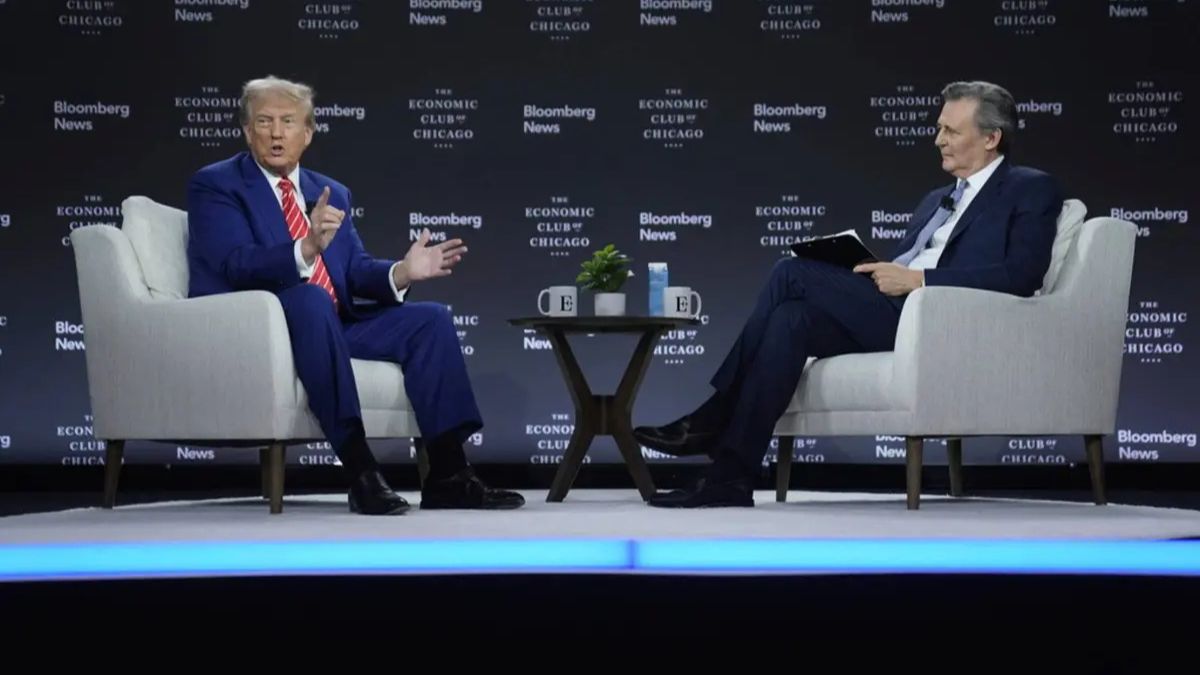Donald Trump with Bloomberg Editor-in-Chief John Micklethwait at the Economic Club of Chicago forum on Tuesday (Photo Credit: Used Under Creative Common License 4.0).
Donald Trump’s interview with the Economic Club of Chicago was a “nothing burger.”
In a forum where political candidates are expected to deliver thoughtful, nuanced and detailed tidbits about proposed economic policies, Trump did not know or execute the assignment. What we got was more of the same old playbook: baseless attacks against his opponent, Vice President Kamala Harris and President Joe Biden, rambling boasts about past achievements and flimsy anecdotes framed around half-baked proposals that experts say would have disastrous effects on our economy.
What’s even worse were the people in that room who cheered heartily for him like they were at a pep rally rather than at a forum hosted by the nonpartisan Economic Club of Chicago, which has hosted numerous U.S. presidents and business leaders in its nearly 100 years of existence.
I wondered if we were hearing the same thing, but ultimately, I realized it didn’t matter.
Economic Plan That Would Backfire
Trump drew cheers for espousing his usual xenophobic rhetoric around immigrants. They applauded his plan for employing across-the-board tariffs on every item imported into this country, including retaliatory import taxes on China, which experts say would lead to substantial price increases and spark trade wars with other countries, even allies.
For instance, the nonpartisan Committee for a Responsible Federal Budget recently reported that Trump’s plan would saddle our nation with more debt by as much as $15 trillion.
During the interview, Bloomberg Editor-in-Chief John Micklethwait attempted to fact-check Trump on his tariff plan, mentioning the negative effect it would have on American consumers. But Trump wouldn’t acknowledge his point.
Deflecting Accountability
When he wasn’t attacking Harris or Biden and boasting about being a “very good businessman,” he highlighted how foreign interests posed an existential threat to American life instead of providing substantive answers to Micklethwait’s questions.
When he wasn’t deflecting questions, Trump resorted to flimsy anecdotes to show how his candidacy would stop those threats to our lives and economy, real, exaggerated, or imagined.
He spoke of an auto plant builder named John, who told him that China was building bigger and better car manufacturing facilities in Mexico that could ultimately hurt U.S. automakers.
“So you mean they’re going to make cars cheaply, they have advantages over labor and other things, and they’re going to sell them into the United States, and they’re going to put Michigan out of business?” asked Trump, who reenacted his dialogue with “John” on the Economic Club stage.
But he also told the Economic Club crowd the rest of that story, including how plans to build a giant auto plant in Mexico were halted.
“They abandoned the project when they heard you’re running,” said Trump about what John told him. “They abandoned the project when they saw that you were winning and doing well.”
“If I’m going to be President in this country, I’m gonna put a 100, 200, 2,000% tariff. They’re not going to sell one car into the United States,” said Trump, drawing a hearty applause.
A Pep Rally, Not a Forum
He once again downplayed his role in the January 6 U.S. Capitol attacks. When asked about whether he would commit to respecting and encouraging a peaceful transfer of power, Trump chose to highlight Democratic protests to his 2016 Presidential election victory,
He regurgitated tropes about illegal immigrants, painting them as criminals and escapees from insane asylums. He also chastised Micklethwait and said that the press is corrupt and needs to be straightened out, drawing more cheers from the audience.
Just like at the NABJ Convention this Summer, Trump carried on as usual, showing no respect for the history of the storied organization that hosted him.
What occurred Tuesday stands in sharp contrast to a February 1991 Economic Club of Chicago appearance by former President Jimmy Carter, who said during his address that “A measure of the greatness of a nation, including ours, is how strong a force for peace we can be.”
[perfectpullquote align=”full” bordertop=”false” cite=”” link=”” color=”” class=”” size=””]But during this election cycle, we have a candidate who seems to relish chaos, disunity, obstruction and incoherence, conveying a content, tone and mood at war with the very notion of peace. [/perfectpullquote]
A Troubling Reflection
The cheers in that room were not just about Trump’s economic policies; they were about something far more troubling.
What any objective observer heard at that forum should have frightened them. The unabashed support of the former president is dangerous, considering what it could mean to our economy.
Those reporters also showed that they are willing to sacrifice sound economic policy to preserve a society where only a few benefit and the rest, whom they view as “others,” suffer.
In 2024, Trump’s cruelty has become even more emboldened, and sadly, for his supporters, his making sense or being humane and considerate are no longer required.



